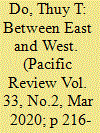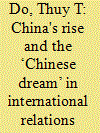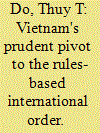| Srl | Item |
| 1 |
ID:
171021


|
|
|
|
|
| Summary/Abstract |
That East Asian IR communities are increasingly interested in knowledge production has become self-evident. While the form that this interest is taken in China is predominantly focused on developing a Chinese School of International Relations Theory (IRT), the situation in Japan is much more diverse and complicated. This article examines the impact of the non-Western IRT movement on Japanese IR academia from a sociology of science perspective. It finds that while indigenous theorizing has garnered interests in a portion of Japanese IR academia due to both internal and external driving forces, there have been few claims for and actual theorizing on a ‘Japanese brand-name’ in IRT like the ‘Chinese School.’ The majority of Japanese IR scholars remain strongly attached to mainstream IRT or the traditional historical and area studies. Such development has its roots in the structural restraints embedded in Japan’s unresolved identity as a de facto polity situated between ‘East and West’ and the heritage of its war-time history. Given these characteristics of IR studies in Japan, the different components of Japanese IR academia will most likely follow their own trajectory without integration and synthesis. This will position Japanese IR, just like its current foreign policy, at a crossroads.
|
|
|
|
|
|
|
|
|
|
|
|
|
|
|
|
| 2 |
ID:
142021


|
|
|
|
|
| Summary/Abstract |
The rise of China/East Asia and the perceived decline of the US/West pose an emerging question about how international relations (IR) theory should respond to this change. Increasingly, there have been heated discussions among Chinese IR academics over a desirable Chinese contribution to IR theory (IRT), particularly the possibility of building a distinctive Chinese IRT. Inevitably, this drive towards theorizing from a Chinese perspective also creates a backlash among not only Western but also other Chinese scholars as they question the ‘nationalistic’ if not ‘hegemonic’ discourse of the scholarship. Drawing on the sociology of scientific knowledge framework, this article examines the linkages between the vibrant dynamics of the Chinese theoretical debates and the actual practices of Chinese scholars in realizing their claims. It suggests that this investigation can serve as a springboard into a better appreciation of the theory–practice and power–knowledge relationships in the context of Chinese IR.
|
|
|
|
|
|
|
|
|
|
|
|
|
|
|
|
| 3 |
ID:
191744


|
|
|
|
|
| Summary/Abstract |
Vietnam's conceptualization of the international and regional orders has changed remarkably over the past decades. Previously an outsider if not a challenger of the western-crafted liberal order, Vietnam has in recent years increasingly leaned toward a rules-based international order. This article argues that the reason for Vietnam's changing perceptions about the liberal international order is largely threefold: domestic reform and modernization; deepened integration into the international political economy; as well as growing strategic concerns over great power coercion stemming from China's rise. Vietnam's pivot to the rules-based international order, however, is cautious given Hanoi's lingering worry over western intentions to undermine Vietnam's socialist orientation, the path dependence of Vietnam's relationships with its traditional partners as well as the occasional clashes between the old, conservative worldview and the new, open-minded thinking in shaping its foreign policy. As a result, Vietnam's vision for a rules-based international order emphasizes universally negotiated rules and institutions, rather than western-dominated ones, with a focus on the rules and norms promoted by the United Nations and ASEAN. Amid the current power shift, Vietnam supports an emerging multi-polar and multi-center order in which small and medium states like itself would have a bigger voice and greater agency.
|
|
|
|
|
|
|
|
|
|
|
|
|
|
|
|